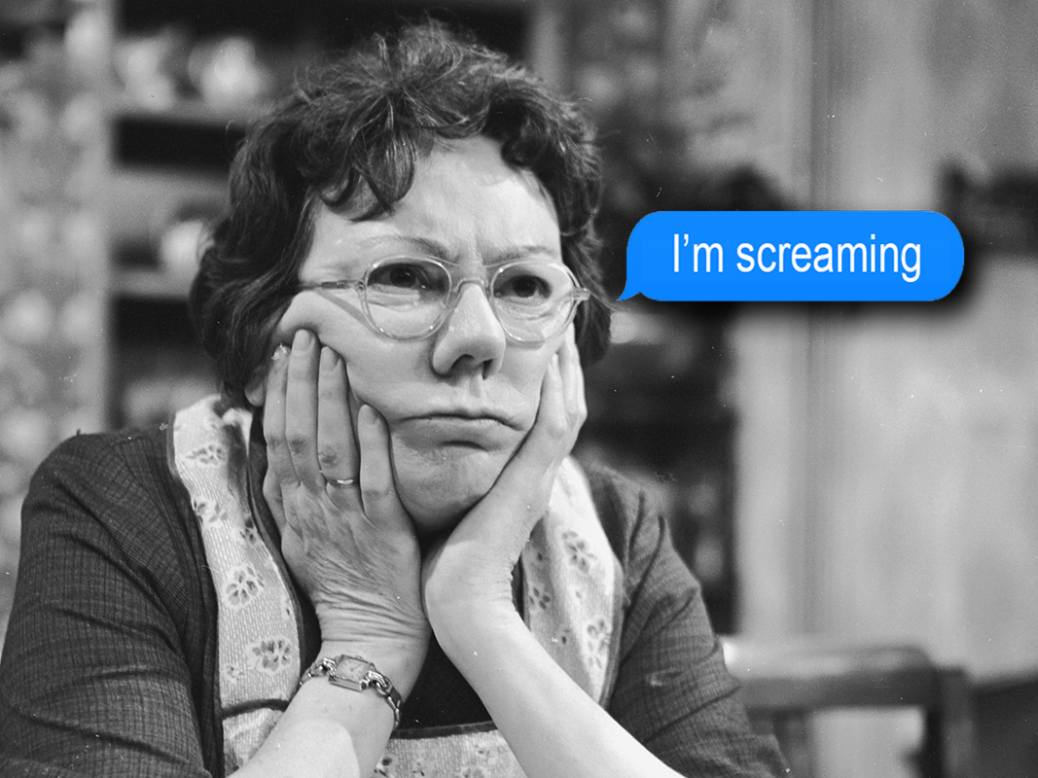
On the internet, no one can hear you scream. This is just as well, as most of the time people online say they’re screaming, they are totally not. “Screaming”, “crying”, “sobbing”, and “dying” are popular reactions to online jokes that rarely, if ever, reflect real-life actions. Since the early 2010s, people have been typing “I AM SCREAMING” – caps and all – when they’re anything but.
“I don’t actually scream,” explains Emilija Ilic, a 25-year-old from Serbia, who is just one of hundreds of Twitter users who used the slang on the site today. I asked her what she’s actually doing when she types those words. “Whenever I type it, I do feel extremely excited, happy or hyper,” she says. “It’s more of an internal screaming.”
Why are we using such extreme words to represent our unextreme emotions? Since the start of online communication, various words and symbols have been developed to emulate real-life body language and facial expressions. “Lol” is arguably the most popular of these new online cues, yet as early as 2001 the eminent linguist David Crystal noted that people weren’t usually laughing out loud when they typed those three letters.
In 2017, when a friend sends us “lol”, we don’t imagine they are actually laughing. Perhaps “screaming” and “crying” have almost emerged as the new “lol”? When someone writes “lol” we assume they have a stony face, and when they write “screaming” we assume they have at least lolled.
“It’s a process that is universal in language, which linguists call ‘semantic inflation’,” explains Deborah Tannen, a professor of linguistics at Georgetown University and author of You’re the Only One I Can Tell. “As words come to be used more and more, their meaning is bleached, and new words are adopted to capture the original strength. Those words, too, are weakened by use and replaced by new ones.”
Semantic inflation is an age-old phenomenon: “genius”, “literally”, and “epic” are all words that have strayed from their original meaning. Naomi Baron, a professor of linguistics at American University, gives the example of “awesome”, which was originally used when something inspired genuine awe. Today we use it as a substitute for “yes”, she explains, so that when a friend asks us to meet for dinner at six, we reply with the word.
“The online acronym ‘lol’ has undergone a similar sort of repurposing,” she says, “[It has] come to mean everything from ‘Uh huh’ – essentially, just a filler for acknowledging that the other person has written something – to sarcasm.”
It is possible that in ten years “I’M SCREAMING” could be as flippant as today’s “lol”. This could lead us to create or repurpose more extreme-sounding words. “Dead” or “dying” were once impactful words that are now used as online slang when someone is laughing or shocked, but they don’t (spoiler alert) reflect the typist’s actual state.
Rather than assuming the dead and the screaming have bastardised language, however, we now have to accept that old words have new definitions. A person who types “I’m screaming” isn’t screaming as we traditionally know it, but they still sort of are. “Scream” has a new meaning, even though the Oxford English Dictionary hasn’t yet caught up.
“People get upset because they think words should mean what the dictionary says they mean, but dictionaries simply capture the meaning of words as people use them at a given time,” says Tannen. “Meaning comes from use, not dictionaries. People also get upset because they think words should continue to mean, and to be used, just as they did when we first learned them.” Tannen herself views it more pragmatically. “Emotional overtones in particular tend to weaken over time, so we need new ways to capture emotional impact.”
Emilija, the Twitter user who recently “screamed” on the site, agrees. “It expresses emotions better than ‘I’m excited’,” she says. “It’s used only to describe a high level of excitement.”
If Edvard Munch’s The Scream were painted today, the iconic artwork would be considerably different. The central figure’s hands wouldn’t be clasped on his cheeks, and his mouth would not be a wide and determined “O”. Instead, his expression and his hands would be flat. The orange glow of the sunset would be replaced by the white glow of a screen. His mouth would be closed. But he’d still be screaming.





